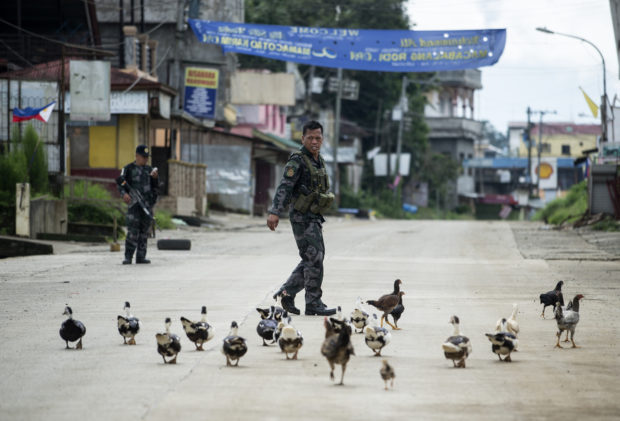Arguments at SC: Is there rebellion to justify proclamation of martial law?

Ducks and chickens follow a police officer near a checkpoint in Marawi on the southern island of Mindanao on June 12, 2017.
Embattled Philippine troops struggling to force out Islamist militants from a southern city raised the national flag for Independence Day on June 12, in a tearful ceremony dedicated to the scores killed during the conflict. / AFP PHOTO / NOEL CELIS
There are human rights considerations contained in General Order No. 1 on the implementation of Proclamation 216, Supreme Court Associate Justice Marvic Leonen said during the first day of the three-day presentation of oral arguments on the declaration of martial law over the whole of Mindanao.
“But the objective in the operational parameters do not seem to be here and therefore can we say that martial law might be a bit vague?” Leonen noted.
Leonen added that he was not certain if the 60-day duration of martial law applied to the whole of Mindanao or for Marawi City only.
“That is a dangerous area in the report. The report says until needed to quell [rebellion] completely,” Marlon Manuel, one of the counsels of the petitioners said.
Manuel added that proclamation seemed to be an indefinite tone.
“We have not quelled past rebellions,” he added.
The justices also asked petitioners if the actions by the Maute Group could be considered rebellion to justify the proclamation of martial law.
The petitioners, led by Albay Rep. Edcel Lagman, said the reason President Rodrigo Duterte gave for declaring martial were “false, inaccurate and contrived.”
He also cited the erroneous facts cited by the chief executive – including the alleged beheading of the Marawi police chief and the taking over of a hospital and a school.
“Verily, not only there was no sufficient basis of rebellion, there was also no factual anchorage for this necessity of imposing martial law to secure public safety. President Duterte should have validated the situation on the ground upon arriving home, exercise due discretion,” Manuel told the justices.
He further argued that a key element in act of rebellion – culpable purpose of removing allegiance from the Philippines and preventing the President and legislature from exercising their functions – was not present in the Marawi siege.
Manuel said that, under the 1987 Constitution, martial law must be “an instrument of last resort.”
“If there is a remedy less severe than martial law, such less severe remedy must be resorted to,” he argued. “nly when there is a showing that the situation cannot be contained unless martial law is declared, can the use of such extraordinary power of the President be justifiable.”
But Solicitor General Jose Calida rebutted the allegations of the petitioners and insisted that there was rebellion by the Maute Group.
“Who would ever believe that what is happening now in Malawi is not rebellion? All the elements or rebellion are there – armed public uprising and allegiance to ISIS (Islamic State of Iran and Syria)?” he told reporters in an ambush interview.
During interpellation, Associate Justice Mariano del Castillo asked Lagman if he personally witnessed the situation in Marawi so that he could claim there was no rebellion.
“You have not been there on the ground,” Del Castillo said; “You don’t know what the situation is there. So how can you dispute now the findings of the sufficiency of the factual basis for the declaration?”
In response, Lagman said he did not have to personally fly to Marawi since the basis of their questions could be found in the mandatory report submitted by the President to Congress.
Associate Justices Lucas Bersamin and Estela Perlas -Bernabe cited the presumption of validity of the declaration by the President, who should be given deference on the matter as the commander-in-chief. Both justices put on petitioners the burden to prove the grave abuse of discretion on the part of the President.
Senior Associate Justice Antonio Carpio, on the other hand, questioned why the declaration covered the whole of Mindanao.
“You said that in rebellion, there should be an actual rebellion for martial law to be declared. Can you point to any incident that in the Agusan provinces that there was rebellion?” he asked during interpellation,.
“No, your honor,” Lagman said”
“Under the present Constitution, there must be actual rebellion,” Carpio said.
Lagman noted that the executive branch had been citing imminent danger, that members of the terrorist group had been scattered in Mindanao ready to attack.
“Suppossing the Maute Group, 10 of them dropped their weapons and proceeded to Agusan, will their presence be considered rebellion?” Carpio asked.
“No,” Lagman said.
For his part, Leonen pointed out that martial law “should have clear operational guidelines because it’s not simple declaration but, rather, it has real effects.”
He added that the Supreme Court has the power to review the declaration and should not give full deference to the chief executive and dismiss the petitions on technicalities.
The oral arguments will resume 10 a.m. on Wednesday with the justices continuing their interpellation of the petitioners. /atm